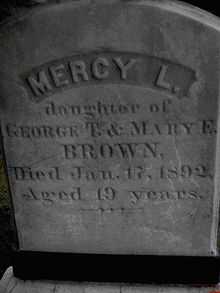Mercy Brown vampire incident

The Mercy Brown Vampire Incident, which occurred in 1892, is one of the best documented cases of the exhumation of a corpse in order to perform rituals to banish an undead manifestation. The incident was part of the wider New England vampire panic.
Several cases of consumption (tuberculosis) occurred in the family of George and Mary Brown, in Exeter, Rhode Island. Friends and neighbors believed that this was due to the influence of the undead. Two family members' bodies were dug up, and, exhibiting the expected level of decomposition, were thought not to be the cause. Daughter Mercy, however, who was held in a freezer-like, above-ground vault, exhibited almost no decomposition. This was taken as confirmation that the undead were influencing the family to be sick. Mercy's heart was burned, mixed with water and given to her brother Edwin, who was sick, to drink, in order to stop the influence of the undead. The young man died two months later.
History
In Exeter, Rhode Island, the family of George and Mary Brown suffered a sequence of tuberculosis infections in the final two decades of the 19th century. Tuberculosis was called "consumption" at the time and was a devastating and much-feared disease.
The mother, Mary, was the first to die of the disease, followed in 1888 by their eldest daughter, Mary Olive. Two years later, in 1890, their son Edwin also became sick.[1]
In 1891, another daughter, Mercy, contracted the disease and died in January 1892. What remained of her body was buried in the cemetery of the Baptist Church in Exeter after being desecrated.
Friends and neighbors of the family believed that one of the dead family members was a vampire (although they did not use that name) and had caused Edwin's illness. This was in accordance with threads of contemporary folklore linking multiple deaths in one family to undead activity. Consumption was a poorly understood condition at the time and the subject of much superstition.
George Brown was persuaded to give permission to exhume several bodies of his family members. Villagers, the local doctor and a newspaper reporter exhumed the bodies on March 17, 1892.[1] While the bodies of both Mary and Mary Olive had undergone significant decomposition over the years, the more recently deceased Mercy was still relatively unchanged and had blood in the heart and liver. This was taken as a sign that the young woman was undead and the agent of young Edwin's condition. Her lack of decomposition was more likely due to her body being stored in freezer-like conditions in an above-ground crypt, during the 2 months following her death.
As superstition dictated, Mercy's heart was removed from her body, burned, and the remnants mixed with water and given to the sick Edwin to drink. It was thought that giving the victim of consumption ashes of the "vampire's" heart would cure them, but he died two months later.[1]
Literature
The Mercy Brown incident was the inspiration for Caitlín R. Kiernan's short story, "So Runs the World Away", which makes explicit reference to the affair. It has also been suggested by scholars that Bram Stoker, the author of the novel Dracula, knew about the Mercy Brown case through newspaper articles and based the novel's character Lucy upon her.[2] It is also referenced in H. P. Lovecraft's "The Shunned House".[3] Mercy Brown's story was the inspiration for a young adult novel, Mercy: The Last New England Vampire by Sarah L. Thomson. Rapper B. Dolan also wrote a song from the perspective of a fictitious party involved in the case in his song "The Hunter" from his 2010 LP Fallen House, Sunken City.[4]
References
- ↑ 1.0 1.1 1.2 Tucker, Abigal (October 2012). "The Great New England Vampire Panic". Smithsonian Magazine: 3. Retrieved 29 June 2013.
- ↑ http://www.smithsonianmag.com/history-archaeology/The-Great-New-England-Vampire-Panic-169791986.html
- ↑ Spiers, Richard (2004). "Mercy Brown: A Real Rhode Island Vampire". Underworld Tales Magazine. Retrieved 18 June 2011.
As Lovecraft's Mercy Dexter character allows the plot to flow, he cagily reveals, "[don't] hire anyone from the Nooseneck Hill country … seat of uncomfortable superstitions. As lately as 1892, an Exeter community exhumed a dead body and ceremoniously burnt its heart in order to prevent certain alleged visitations."
- ↑ "The Hunter lyrics".
- Bell, Michael E. (2001). Food for the Dead - On the Trail of New England's Vampires. New York: Carrol & Graf Publishers. 338 pages. ISBN 0786708999.
- Connecticut Public Television (1996). Vampires in New England (TV Documentary).
External links
- Smithsonian Magazine account of Historical Vampires
- O.T.I.S.(Odd Things I’ve Seen): A Firsthand Account of Mercy Brown’s Grave
- Mercy Brown at Find a Grave